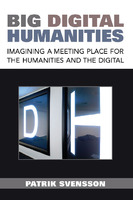Big Digital Humanities: Imagining a Meeting Place for the Humanities and the Digital
External Review of Whole Manuscript
Abstract
Big Digital Humanities has its origins in a series of seminal articles Patrik Svensson published in the Digital Humanities Quarterly between 2009 and 2012. As these articles were coming out, enthusiasm around Digital Humanities was acquiring a great deal of momentum and significant disagreement about what did or didn’t “count” as Digital Humanities work. Svensson’s articles provided a widely sought after omnibus of Digital Humanities history, practice, and theory. They were informative and knowledgeable and tended to foreground reportage and explanation rather than utopianism or territorial contentiousness. In revising his original work for book publication, Svensson has responded to both subsequent feedback and new developments. Svensson’s own unique perspective and special stake in the Digital Humanities conversation comes from his role as director of the HUMlab at Umeå University. HUMlab is a unique collaborative space and Digital Humanities center, which officially opened its doors in 2000. According to its own official description, the HUMlab is an open, creative studio environment where “students, researchers, artists, entrepreneurs and international guests come together to engage in dialogue, experiment with technology, take on challenges and move scholarship forward.” It is this last element “moving scholarship forward” that Svensson argues is the real opportunity in what he terms the “big digital humanities,” or digital humanities as practiced in collaborative spaces like the HUMlab, and he is uniquely positioned to take an account of this evolving dimension of Digital Humanities practice.
Keywords
MediaDOI
10.3998/dh.13607060.0001.001ISBN
9780472073061;9780472053063OCN
954165993Publisher
University of Michigan PressPublisher website
https://www.press.umich.edu/Publication date and place
Ann Arbor, 2016Series
Digital Humanities,Classification
Education


 Download
Download Web Shop
Web Shop